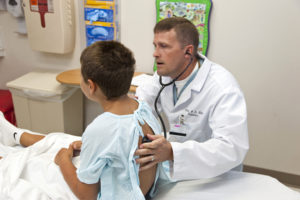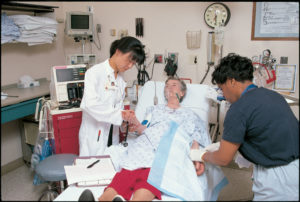

Cases have been reported in 49 states for weeks and more than 6 percent of all patients at clinics and emergency departments are there because they are showing flu-like symptoms, the Centers for Disease Control and Prevention (CDC) reports.
If you have a non-emergency illness, first seek help with your primary care physician or urgent care. Common flu symptoms include fever/chills, cough, sore throat, runny nose, headache or body ache, fatigue or vomiting/diarrhea. If you have any emergency warning signs of flu, or flu-related complications, please go to the nearest ER immediately.
“This is a particularly dangerous flu season, and your first line of prevention is to take appropriate precautions including washing your hands and avoiding direct contact with ill people,” said Paul Kivela, MD, MBA, FACEP, president of ACEP.
ACEP is the national medical specialty society representing emergency medicine.

The flu shot is recommended for anyone over the age of 6 months, including pregnant women.You can avoid spreading germs by washing your hands, covering your mouth when you cough and staying home from work, school or other activities if you are not well.
“Most people with flu typically do not require emergency care, but this season’s disease strain is much more active than previous years. Public health experts project that tens of thousands of people could suffer flu-related deaths. If you have emergency warning signs or complications, go to the nearest emergency department immediately,” said Dr. Kivela.
In addition, Dr. Kivela said that emergency physicians seeing are increased cases of patients with irregular heart rhythms and heart attacks during or in the days after someone had the flu. Some people are also developing swelling in mouth or neck, which could be serious.

For adults:
Difficulty breathing or shortness of breath
Chest pain or abdominal pain
Sudden dizziness
Confusion
Severe or persistent vomiting
Flu-like symptoms that improve but then return with fever and worse cough
Swelling in the mouth or throat
Weakness
For children:

Bluish skin color
Not drinking enough fluids
Not waking up or not interacting
Being so irritable that the child does not want to be held
Flu-like symptoms improve but then return with fever and worse cough
Fever with a rash
In addition to the signs above, seek medical attention for an infant who shows any of these signs:
Not able to eat
Trouble breathing
No tears when crying
Significantly fewer wet diapers than normal
“If you have these warning signs, you should seek emergency care, even if your health insurance company tells you not to,” said Dr. Kivela.
Visit www.emergencycareforyou.org for more information on recognizing an emergency, choosing between the emergency department or urgent care and other topics.
Visit www.cdc.gov/flu for specific information on the current flu season.
ACEP is the national medical specialty society representing emergency medicine. ACEP is committed to advancing emergency care through continuing education, research and public education.
Headquartered in Dallas, Texas, ACEP has 53 chapters representing each state, as well as Puerto Rico and the District of Columbia. A Government Services Chapter represents emergency physicians employed by military branches and other government agencies.
http://www.acep.org












